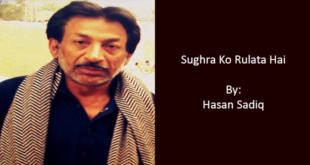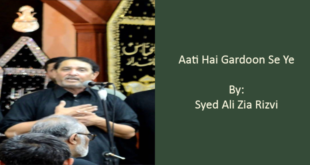Sughra Ko Rulata Hai Sughra ko rulata hai ye chaand muharram ka.Sughra ko rulata hai ye chaand muharram ka (x2).Jab saamnay aata hai (x2). Ye chaand muharram ka. Sughra ko rulata hai… Hum surat-e-Zehra se bhai ke bichadnay ki.Khatoon-e-qayamat ke ghar baar ujadnay ki.Ghar baar ujadnay ki.Rudaad sunata hai. Ye chaand …
Read More »Aati Hai Gardoon Se – Ali Zia Rizvi 1980’s
Aati Hai Gardoon Se Aati hai gardoon se ye payham sada.Qatl huay sajde mein Sher-e-Khuda.Khana-e-haq may ye ghazab ho gaya. Qatl huay… Aati hai gardoon… Gham se hai Zainab nidhaal. Khol diye sar ke baal.Kehti hai ye pur malaal. Dekho to baba kahan.Dete hain Jibreel ye kaisi nida. Qatl huay… Aati hai gardoon… Saath paday jalwagar. Kehti …
Read More » Abul Hasan Lakhani About Everything I Love!
Abul Hasan Lakhani About Everything I Love!

